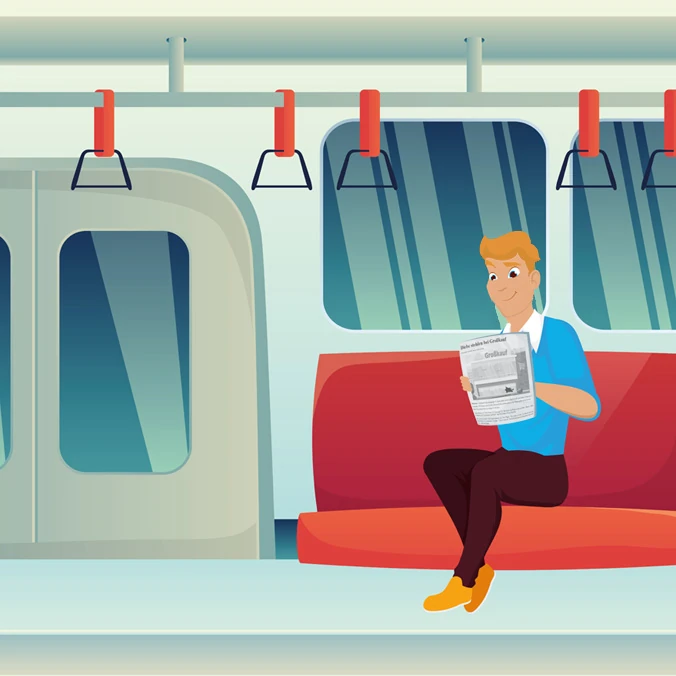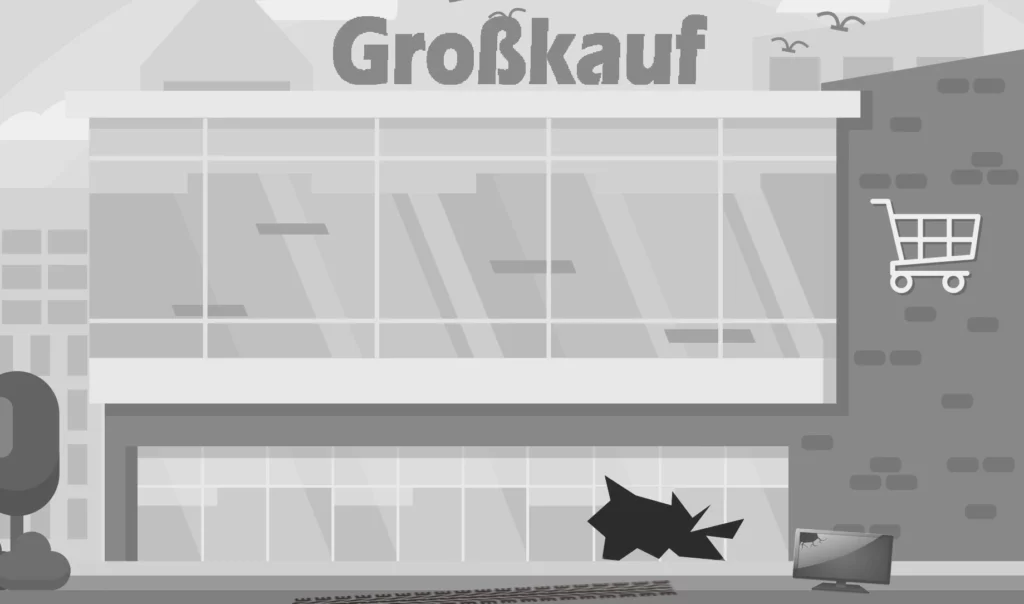Play
Pause
1X
A1
Learn:

Diebethieves
noun (m.) stehlento steal
verb beihere it means: from
preposition GroßkaufGroßkauf (imaginary shopping mall)
noun (m.)
Thieves steal 'at' Großkauf (meaning: they steal from Großkauf)
Diebethieves
noun (m.) stehlento steal
verb Computercomputer(s)
noun (m.) , Handysmobile phones
noun (n.) , iPadsiPads
noun (n.) undand
conjunction Geldmoney
noun (n.) .
Thieves steal computers, cell phones, iPads, and money.

MünchenMunich (city)
noun - GroßkaufGroßkauf (imaginary shopping mall)
noun (m.) inin; into
preposition derthe (masculine)
article AdamstraßeAdam Street
noun (f.) 76: Diebethieves
noun (m.) gehento go; walk
verb nachtsat night
adverb inin; into
preposition dasthe (neuter); that
article Geschäftshop; business; store
noun (n.) undand
conjunction stehlento steal
verb 29 Druckerprinter(s)
noun (m.) , 52 Computercomputer(s)
noun (m.) , 198 Handysmobile phones
noun (n.) undand
conjunction 41 iPadsiPads
noun (n.) . Diethe
article zweitwo
numeral Diebethieves
noun (m.) stehlento steal
verb nichtnot
particle nuronly; just; merely
adverb dasthe (neuter); that
article . Warumwhy
adverb gehento go; walk
verb sieshe; they
personal pronoun auchalso, too, as well
adverb inin; into
preposition dasthe (neuter); that
article Bürooffice
noun (n.) ? Sieshe; they
personal pronoun suchento look for; search
verb Geldmoney
noun (n.) . Sieshe; they
personal pronoun stehlento steal
verb 85.www.mein-laden.de (imaginary website)
000 Euroeuro (€)
noun (m.) .
Munich - Großkauf in the Adamstraße (adam street) seventy-six: Thieves go into the store at night and steal 29 printers, 52 computers, 198 cell phones and 41 iPads. The two thieves don't just steal that. Why do they also go into the office? They are looking for money. They steal 85,000 euros.
Dann then
adverb stehlen to steal
verb sie she; they
personal pronoun 35 MP3-Player MP3 player(s)
noun (m.) , 64 Uhren clocks; watches
noun (f.) und and
conjunction 287 USB-Sticks thumb drives
noun (m.) . Die the (feminine) / plural
article Polizei police
noun (f.) sucht searches; looks for
verb die the (feminine) / plural
article Diebe thieves
noun (m.) . " Handys mobile phones
noun (n.) , iPads iPads
noun (n.) , Computer computer(s)
noun (m.) und and
conjunction Uhren clocks; watches
noun (f.) kosten to cost
verb viel much; a lot
pronoun Geld money
noun (n.) ," sagt says
verb Fritz Fritz (name)
noun (m.) Hagen Hagen (last name)
noun , Polizei police
noun (f.) München Munich (city)
noun .
Then they steal 35 MP3 players, 64 watches and 287 thumb drives. The police is looking for the thieves. "Cell phones, iPads, computers and watches cost a lot of money," says Fritz Hagen, Munich police.
Wer who; whoever
adverb sind are
verb die the (feminine) / plural
article Diebe thieves
noun (m.) ? Und and
conjunction woher from where
adverb kommen to come; appear
verb sie she; they
personal pronoun ? Fritz Fritz (name)
noun (m.) Hagen Hagen (last name)
noun : " Wir we
personal pronoun wissen to know
verb es it
personal pronoun nicht not
particle . Sie they
personal pronoun kommen to come; appear
verb nicht not
particle aus out; out of; from
preposition Deutschland Germany
noun . So so; such; in this manner
adverb viel much; a lot
pronoun können can; may; to be able to
verb wir we
personal pronoun sagen to say
verb ." Und and
conjunction wo where
adverb sind are
verb sie she; they
personal pronoun ? " Die the (feminine) / plural
article Diebe thieves
noun (m.) sind are
verb noch still; yet; else
adverb in in; into
preposition Deutschland Germany
noun , das the (neuter); that
article wissen to know
verb wir we
personal pronoun ," sagt says
verb Fritz Fritz (name)
noun (m.) Hagen Hagen (last name)
noun .
Who are the thieves? And where do they come from? Fritz Hagen: "We don’t know it. They don’t come from Germany. We can say that much." And where are they? “The thieves are still in Germany, we know that,” says Fritz Hagen.
Die the (feminine) / plural
article Polizei police
noun (f.) sucht searches; looks for
verb die the (feminine) / plural
article Diebe thieves
noun (m.) und and
conjunction möchte would like
verb wissen to know
verb : Wer who; whoever
adverb sind are
verb sie she; they
personal pronoun ? Und and
conjunction wo where
adverb sind are
verb sie she; they
personal pronoun ?
The police is looking for the thieves and would like to know: Who are they? And where are they?
Können can; may; to be able to
verb Sie you (formal)
personal pronoun helfen to help
verb ? Die the (feminine) / plural
article Nummer number
noun (f.) von from; of; by
preposition Fritz Fritz (name)
noun (m.) Hagen Hagen (last name)
noun ( Polizei police
noun (f.) München Munich (city)
noun ): 09286/173-154.
Can you help? The number of Fritz Hagen (Munich Police): 09286/173-154.
Wer who; whoever
adverb ? Zwei two
numeral Diebe thieves
noun (m.) .
Who? Two thieves.
Was what / something (coll.)
adverb ? Sie they
personal pronoun stehlen to steal
verb Drucker printer(s)
noun (m.) , Computer computer(s)
noun (m.) , Handys mobile phones
noun (n.) , MP3-Player MP3 player(s)
noun (m.) , Uhren clocks; watches
noun (f.) und and
conjunction USB-Sticks thumb drives
noun (m.) . Sie they
personal pronoun gehen to go; walk
verb auch also, too, as well
adverb in in; into
preposition das the (neuter); that
article Büro office
noun (n.) .
What? They steal printers, computers, cell phones, MP3 players, watches and USB sticks. They also go into the office.
Warum why
adverb ? Sie they
personal pronoun stehlen to steal
verb Geld money
noun (n.) .
Why? They steal money.
Wie how / like; as (comparison)
adverb viel much; a lot
pronoun Geld money
noun (n.) ? 85.000 Euro euro (€)
noun (m.) .
How much money? 85,000 euros.
Wo where
adverb ? Großkauf Großkauf (imaginary shopping mall)
noun (m.) , Adamstraße Adam Street
noun 76, in in; into
preposition München Munich (city)
noun .
Where? Großkauf, Adamstraße seventy-six, in Munich.
Wann when
adverb ? Nachts at night
adverb .
When? At night.
New words
Adamstraße
Adam street
Drucker
printers
Computer
computers
Diebe
thieves
Fritz Hagen
Fritz Hagen (name)
gehen
to go; walk
das Geschäft
the shop; business
Großkauf
Großkauf (imaginary name of a shop)
Handys
mobile phones
kosten
to cost
MP3-Player
MP3 players
nachts
at night
noch
still; yet; else
nur
only; just; merely
die Polizei
the police
er, sie, es sagt
he, she, it says
stehlen
to steal
er, sie, es sucht
he, she, it is looking for
Uhren
clocks; watches
USB-Sticks
thumb drives
wann
when
warum
why
wissen
to know
The missing numbers:
0 null
30 dreißig
40 vierzig
60 sechzig
70 siebzig
80 achtzig
90 neunzig
100 (ein)hundert
101 hunderteins
200 zweihundert
1.000 (ein)tausend
1.000.000 eine Million
2.000.000 zwei Millionen
1 Comprehension quiz
![]()
Hints
Newspapers often use the present tense to appear more up-to-date. Even though the events actually took place in the past.
Wer, wie, was, wann, wo and warum are the 6 most important question words. Some expressions relate to them:
wie (how) | viel (much)
➞ wie viel = how much
wo (where)
➞ woher = from where
BUT: Wohnen is a verb. It’s not related to wo.
Some examples for their usage:
wer (who)
Wer ist Paul?
Who is Paul?
wie (how)
Wie geht’s?
How is it going?
was (what)
Was ist das?
What is that?
warum (why)
Warum nicht?
Why not?
wo (where)
Wo ist München?
Where is Munich?
wann (when)
Wann kommt Paul?
When does Paul come?
Because one more awesome learning tool is waiting for you:
6 Responses
Hi, I am listening again all episodies, and thus be able to understand, pronounce and write any single word of the whole story. First of all I am happy to notice that you reply every comments. Then I’d like to leave another comment:
At the end of this episode at the questions who, what, why etc, there are something that I didn’t understand clearly.
The question “who” – 2 thieves; “what” – they steal computers, printers etc; and “why” – they steal money?
My question is: money should not be answer for “what” also? Or this is a German grammar structure?
Hi Flavio!
Thank you very much. We try our best to reply to all comments.
The info box in the newspaper article that Paul is reding has the key facts in the form of pinpoints. So by “who” the author wanted to say “who did it”, and by “what” he/she wanted to say “what happened” and by “why” he/she wanted to know “why did they do it” (why did they also go in the office? – to steal money). So, from the context you learn to understand what the whole, unabbreviated question would be. He/she could have written the article in a different manner. Then the questions and answers would have been different, too. The topic here is just to learn these 6 question words by understanding how the journalist used them.
ich telefoniere dir?oder ich telefoniere dich?
Ich telefoniere mit dir.
Hi, when I click on the podcast player to adjust the speed or place, I can no longer minimise it without clicking back and starting the whole lesson again. I have a Google pixel. Is there no X or minimise button ok the media player? Thanks.
Hi! Thank you for making us aware of this! We’ve seen the player isn’t being displayed properly and we’ve contacted the developer about this issue. We’ll update this answer when we’ve got news.
Update: We’ve fixed it!